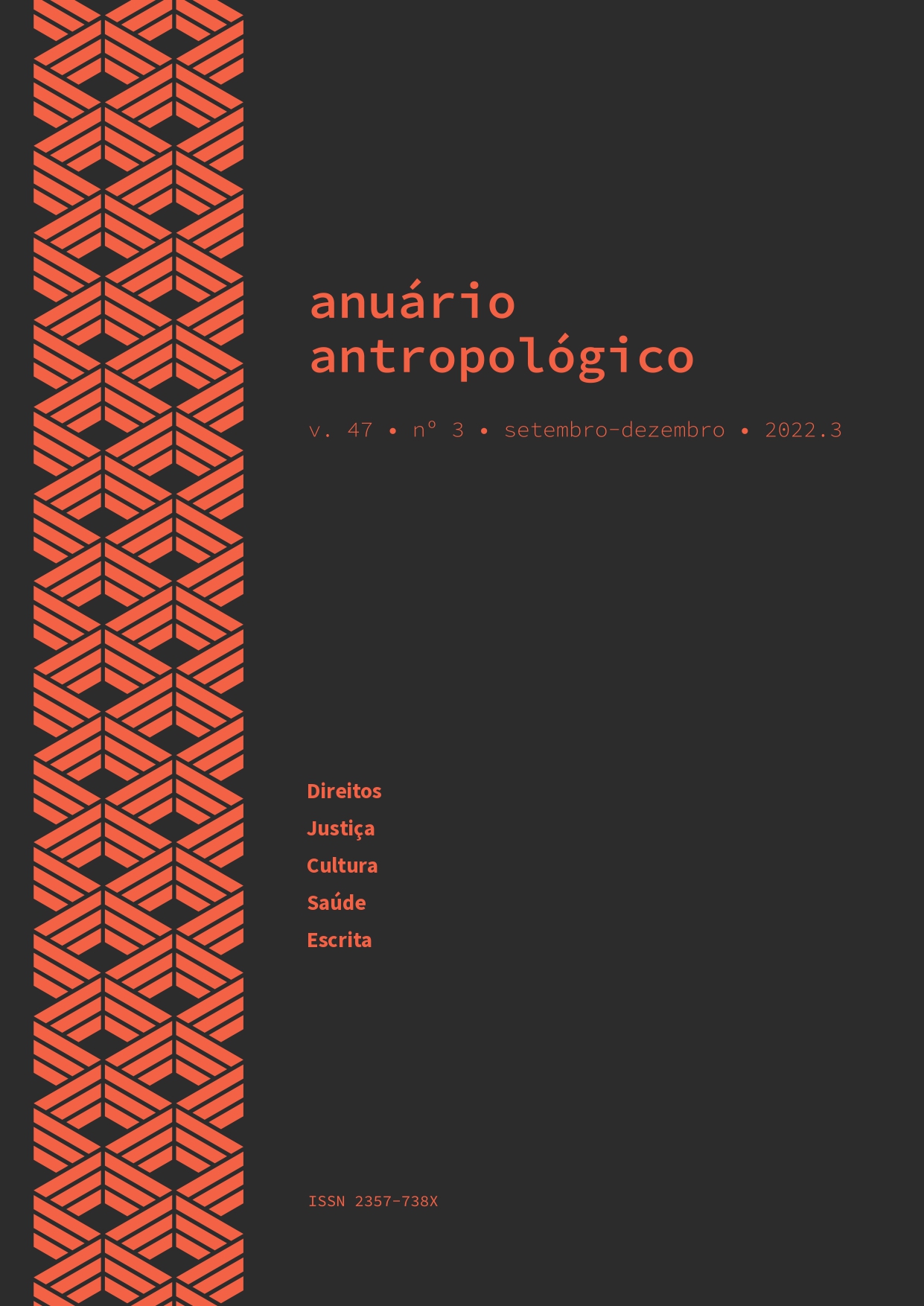Writing gestures in the diaries of Raymundo Faoro (Porto Alegre, 1943-1946)
DOI:
https://doi.org/10.4000/aa.10172Palabras clave:
Raymundo Faoro, Diaries, Porto Alegre/Brazi, Anthropology of writingResumen
Raymundo Faoro (1925-2003), a Brazilian jurist, historian, and writer, is considered one of the most prominent social interpreters in twentieth century Brazil. While studying law in Porto Alegre, he wrote 20 volumes of diaries between 1943 and 1952, a total of almost 6.800 manuscript pages of wholly original content. The purpose of this article is to shed some light on the construction process of this archive, describing and analysing the author’s daily writing. I conceive of writing as a practice, consequently, I seek to examine the gestures in Raymundo’s writing from an ethnographic perspective, looking for motivations and meanings that presided over the course of his writing. Focusing on the first three volumes of the diaries (1943-1946), I concentrate on descriptions of the period in which the author experiences his first years living in Porto Alegre. I argue that besides presenting facts concerning Faoro’s intellectual formation, for the first time, these diaries reveal relevant cultural and social aspects of the period, providing some clues regarding the requisites of becoming an intellectual in twentieth century Porto Alegre and Brazil. In addition to studying diaries as a literary and intellectual genre, I aim to advance the terrain of the anthropological history of writing.
Descargas
Citas
Alcântara, Paulo Augusto. 2018. “Transição com aspas”. In A república em transição. Poder e direito no cotidiana da democratização brasileira (1982-1988), edited by Paulo Augusto Alcântara, Joaquim Falcão, and Raymundo Faoro. São Paulo: Record.
Artières, Philippe. 1998. “Arquivar a própria vida”. Estudos Históricos 11, no. 21 (July 1998): 9–34.
Barber, Karin. 2007. The anthropology of text, persons and publics. Cambridge: Cambridge University Press.
Barton, David, and Uta Papen. 2010. “Introduction”. In The anthropology of writing: Understanding textually mediated worlds, edited by David Barton, and Uta Papen. New York: A&C Black.
Bertolli Filho, Claudio. 2001. História social da tuberculose e do tuberculoso: 1900-1950. Rio de Janeiro: Fiocruz.
Bertraso, José Otávio. 1993. A Globo da Rua da Praia. São Paulo: Globo.
Comaroff, John, and Jean Comaroff. 1992. Ethnography and the historical imagination. Oxford: Westview Press.
DOI : 10.4324/9780429033872
Cunha, Olívia Maria Gomes da. 2005. “Tempo imperfeito: Uma etnografia do arquivo”. Mana 2, no. 10: 287–322.
DOI : 10.1590/S0104-93132004000200003
Davis, Natalie Zemon. 1987. Fiction in the archives: Pardon tales and their tellers in sixteenth-century France. Stanford: Stanford University Press.
DOI : 10.1515/9781503620957
Des Chene, Mary. 1997. “Locating the Past”. In Anthropological locations: Boundaries and grounds of a field science, edited by James Ferguson, 66–85. California: University of California Press.
Faria, Daniel. 2013. “As meditações americanas de Keyserling. Um cosmopolitismo nas incertezas do tempo”. Varia História 29, no. 51 (Sept.-Dec. 2013): 905–23.
DOI : 10.1590/S0104-87752013000300013
Fretta, Cristiano. 2010. As representações de Porto Alegre em Poemas de Minha Cidade, de Athos Damasceno Ferreira. Monograph of Course Conclusion, Universidade Federal do Rio Grande do Sul.
Fabre, Daniel (Dir.) 1993. Écritures ordinaires. Paris: POL.
Foucault, Michel. 2004. “Escrita de si”. In Ética, sexualidade, política, edited by Manoel Barros da Moura, 144–62. Translated by Elisa Monteiro, and lnés Autran Dourado Barbosa. Rio de Janeiro: Forense Universitária.
Freyre, Gilberto. 1946. “Sugestões para o estudo histórico-social do sobrado no Rio Grande do Sul”. Revista Província de São Pedro, no. 7: 10–5. Porto Alegre: Edição da Livraria do Globo.
Garcia, Clarissa Maroneze. 2019. “Aprazível subúrbio: Veraneio e loteamentos balneários no Bairro Belém Novo em Porto Alegre entre os anos 1920 e 1970”. Anais XVIII ENANPUR, Natal-RN.
Golin, Cida, and Paula Viviane Ramos. 2008. “Jornalismo cultural no Rio Grande do Sul: A modernidade nas páginas da revista Madrugada (1926)”. Revista FAMECOS 14, no. 33: 106–14.
Hohlfeldt, Antonio. 2009. “Mário e a Cidade”. Cadernos de Literatura Brasileira. Mário Quintana, no. 25, 89–103. Rio de Janeiro: Instituto Moreira Salles.
Le Goff, Jacques. 1985. “Uma história dramática”. In As doenças têm história, edited by Jacques Le Goff, and Jean-Charles Sournia, 7–9. Lisboa: Terramar.
Lejeune, Philippe. 2009. On diary, edited by Jeremy D. Popkin and Julie Rak. University of Hawaii Press.
DOI : 10.1515/9780824863784
Mann, Thomas. 2016. A montanha mágica. Translated by Herbert Caro. São Paulo: Companhia das Letras.
Martins Filho, Plínio, and Jadyr Pavão. 2003. “Um grande ‘inventor’”. In Cadernos de Literatura Brasileira. Érico Veríssimo, 16. Rio de Janeiro: Instituto Moreira Salles.
Miceli, Sérgio. 2001. Intelectuais à brasileira. São Paulo: Companhia das Letras.
Monteiro, Charles. 2007. “A construção da imagem dos ‘outros’ sujeitos urbanos na elaboração da nova visualidade urbana de Porto Alegre nos anos 1950”. Urbana, no. 2 (Dossiê: Cidade, Imagem, História e Interdisciplinaridade): 1–121.
DOI : 10.20396/urbana.v2i1.8635138
Monteiro, Charles. 1995. Porto Alegre: Urbanização e modernidade – A construção social do espaço urbano. Porto Alegre: EdiPUCRS.
Nedel, Letícia Borges. 2007. “A recepção da obra de Gilberto Freyre no Rio Grande do Sul”. Mana 13, no. 1: 85–118.
DOI : 10.1590/S0104-93132007000100004
Pesavento, Sandra Jatahy. 1994. Os pobres da cidade. Vida e trabalho (1880-1920). Porto Alegre: Editora da Universidade Federal do Rio Grande do Sul.
Pontes, Heloísa. 1988. “Retratos do Brasil: Um estudo dos editores, das editoras e das ‘Coleções Brasilianas’, nas décadas de 1930, 40 e 50”. BIB, no. 26: 56–89.
Santos, João Pedro dos. 2000. A Faculdade de Direito de Porto Alegre. Porto Alegre: Síntese.
Schorske, Carl E. 2012. Fin-de-siècle Vienna: Politics and culture. New York: Vintage Books.
Schwarcz, Lilia K. M. 2013. “Biografia como gênero e problema”. História Social, no. 24: 51–73.
von Keyserling, Hermann Graf. 1925. The travel diary of a philosopher. New York: Harcourt, Brace.
Descargas
Publicado
Cómo citar
Número
Sección
Licencia
Derechos de autor 2023 Anuário Antropológico

Esta obra está bajo una licencia internacional Creative Commons Atribución-NoComercial-SinDerivadas 4.0.
https://creativecommons.org/licenses/by/4.0/legalcode.en
Creative Commons - Atribución- 4.0 Internacional - CC BY 4.0
https://creativecommons.org/licenses/by/4.0/legalcode.en



